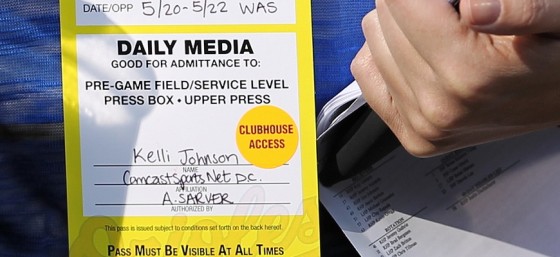The debate over whether bloggers are journalists or members of the media continues. This has been an issue since the inception of blogging and it’s probably going to be an ongoing issue and here’s why – most laws that apply to journalists (like the shield laws) are state-level laws. They’re generally similar but it comes down to how each law was written to determine whether bloggers are journalists in a specific situation. And unless a state revises its laws to specifically address whether bloggers can be journalists, we have to wait until there’s a problem and the blogger who claims to be protected the same as a journalist challenges a situation where they’ve been denied that right.
So far, the courts in California and New Hampshire have said that bloggers can be journalists under those states’ shield laws and the courts in Oregon and Illinois have said that they’re not based on how those states’ laws are worded and the specifics of those cases. I believe that bloggers should be treated the same as journalists under the law when the bloggers are engaged in the same activities. With so many publications becoming only available in digital formats and many legit respected niche blogs being created, it would be foolish to try to categorize as a journalist or a blogger when in essence it’s their activities that matter more than name of the outlet where their work appears.
Here are some recent developments in the blogger/journalist debate:
Florida
Florida’s defamation law says you must give a media outlet five days’ notice before filing a defamation lawsuit against them. Florida businessman Christopher Comins sued blogger Matthew Frederick VanVoorhis for defamation and lost because VanVoorhis successfully argued that blogs are part of the media and therefore the case had to be thrown out because Comins failed to give him five days’ notice about the lawsuit.
I was impressed by how well the court articulated the role of bloggers in news reporting and public commentary: “The impact of blogs has been so great that even terms traditionally well defined and understood in journalism are changing as journalists increasingly employ the tools and techniques of bloggers – and vice versa.”
I was also pleased to see that the court added that not all blogs and bloggers are protected under the law in question. I think that would be overreaching. You can read the full case here. Thanks for posting it Techdirt.
U.S. Senate
SCOTUSblog is generally regarded as a go-to place for news from the U.S. Supreme Court. They’re the main blog I follow via Twitter for updates on rulings. (Did I mention they’ve won a Peabody Award for excellence in electronic media?) Lyle Denniston writes for SCOTUSblog and had a press pass for the Senate Press Gallery. Historically the U.S. Supreme Court recognizes those credentials. However, they said they’d have to review their credentialing policy when he tried to use it at the Supreme Court. (SCOTUSblog writers can get in to Supreme Court proceedings by requesting a public seat.)
Denniston was recently informed that his press pass for the Senate Press Gallery would not be renewed. Attorney Tom Goldstein, founder of SCOTUSblog, said he intends to appeal the decision, and if it’s denied, he’s going to file a lawsuit.
I hope SCOTUSblog doesn’t have to litigate this issue but I’m glad they’re willing to. When I first read this story, my reaction was they were being denied a press pass because someone at the Senate or the Supreme Court doesn’t like them and is trying to use semantics to keep them out. This is going to be a fun situation to watch and an issue worth keeping an eye on in general.
If you want to know more about blogger rights, I strongly recommend two of my books:
- The Legal Side of Blogging: How Not to get Sued, Fired, Arrested, or Killed
- The Legal Side of Blogging for Lawyers
If you want to talk more about this topic, feel free to connect with me on Twitter, Facebook, YouTube, LinkedIn, or you can email me. Please subscribe to the Carter Law Firm newsletter and visit my homepage for more information about Carter Law Firm.
Hat tip to Kevin O’Keefe.
